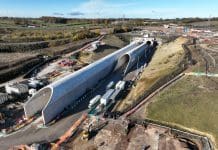The latest monthly construction PMI has revealed a renewed slowdown in output growth across the sector; however, there were signs of resilience in commercial building and residential work
At 52.9 in August, the seasonally adjusted IHS Markit/CIPS UK Construction Purchasing Managers’ Index® (PMI®) eased from July’s 14-month peak of 55.8, but remained above the crucial 50.0 no-change mark.
Commercial building was the best performing area of construction output in August, followed closely by residential work. However, the latest expansion of housing activity was the weakest since March. Meanwhile, work on civil engineering projects decreased for the first time in five months. Several survey respondents cited a lack of new work on infrastructure projects.
Reflecting the trend for construction output, the latest data revealed a slowdown in new business growth from July’s 14-month peak.
Anecdotal evidence cited resilient client demand and supportive economic conditions, but there were also reports that Brexit-related uncertainty continued to hold back investment spending. Higher overall workloads encouraged additional staff recruitment across the construction sector in August. Survey respondents noted tight labour market conditions and shortages of suitably skilled candidates to fill vacancies.
Purchasing activity increased for the eleventh consecutive month in August, although the latest upturn was the weakest since March. Low stock and labour shortages among suppliers continued to impact on delivery times for construction products and materials. The latest deterioration in supplier performance was the greatest witnessed for almost three-and-a-half years. Despite stretched supply chains and rising energy-related costs, latest data indicated that input price inflation edged down to its lowest since July 2016.
UK construction companies appear optimistic that business activity will expand over the next 12 months, but the degree of confidence eased to its weakest since May. Survey respondents cited confidence about achieving organic growth through new project wins and geographical diversification, while Brexit uncertainty remained the main factor cited as holding back sentiment.
Tim Moore, Associate Director at IHS Markit and author of the IHS Markit/CIPS Construction PMI® said: “The construction sector slipped back into a slower growth phase in August, with this summer’s catchup effect starting to unwind after projects were delayed by adverse weather at the start of 2018.
“Civil engineering was the worst performing area of the construction sector, with output in this category falling for the first time since March amid reports citing a lack of new work on infrastructure projects. House building saw a particularly sharp slowdown since July, meaning that commercial construction was the fastest growing sub-sector in August.
“There are some encouraging takeaways from the latest survey, especially the resilient degree of new business growth in August and a strong upturn in staff recruitment. Survey respondents noted that they are confident about achieving organic growth at their businesses in the coming 12 months. The degree of optimism reported in August remained constrained by external factors, including domestic political uncertainty, stretched supply chains and shortages of suitably skilled labour.”















